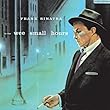 By Daniel Garrett
By Daniel Garrett
Frank Sinatra, In the Wee Small Hours
Produced by Voyle Gilmore
Arranged and conducted by Nelson Riddle
Original release: Capitol Records, 1955
Recent release: Capitol Records, 1998
There’s an early morning remembrance of love, in which Sinatra sounds handsome (masculine, sensitive) and thoughtful, in the song “In the Wee Small Hours of the Morning,” which begins Sinatra’s revered song collection from 1955: in the song, which gives the set its name, Sinatra creates a civil, melancholy mood. He is a gentleman. “Mood Indigo,” the second song, is a Duke Ellington ballad that establishes what it is to be blue, while the words of Rodgers and Hart in the third song acknowledge, “fools rush in, so here I am, very glad to be unhappy.” The song “Glad to Be Unhappy” is self-knowing, containing honesty and wit, and a revelation that is both recognizable and strange: “it’s a pleasure to be sad.” Sinatra sings that song with warm confidence and that takes most of the masochism out of it.
“I Get Along Without You Very Well” is a song I’m more used to hearing women sing, and it’s interesting to hear Sinatra claim the love and vulnerability in the song. His phrasing is conversational but his tone is musical (he never just sounds as if he’s speaking the lyrics, as some singers do). It’s still possible to hear some of today’s singers in Sinatra’s yesterday, especially those singers who respect a lyric (I think of Streisand and Cassandra Wilson). With Sinatra’s delivery of two songs of romantic reverie—“Deep in a Dream” and “I See Your Face Before Me”—I’m inclined to wonder how much of love is dreaming. The album In the Wee Small Hours isolates love as an ideal state. Love can make any man a prince or a pauper. That is transcendence, or the illusion of it. Sinatra makes the subject of love more respectable by making the subject one for contemplation, not merely feeling and expression.
There’s a bold confession of a mistake in “Can’t We Be Friends?” in which Sinatra sings, “I thought for once it couldn’t go wrong,” and expects, “She’s gonna turn me down, /say, Can’t we be friends?” The intimacy of that song, and these other old songs, an intimacy that convinces us we know the hearts and minds of strangers, is an admirable feat.
I wonder if the collection In the Wee Small Hours is as poignant now as it was for listeners when it was first released. Was the world less complex or vulgar then? More romantic? Who can live up to the sophistication of these songs—live up to their experience, understanding, wisdom, and wit? When could the world ever be equal to that kind of beauty? And yet, isn’t it something to aspire to? The excitement and disappointment of love seem not a small and stupid thing, but an important spirit quest. Is it possible for a man to sustain his sensitivity in a materialist society such as ours? What choices does an individual have but complicity or exile? What reward does the society give to artistry but fame and money, or misunderstanding and slander—or all of these? Does it give love to those who speak—and sing—of love?
Sinatra’s voice is reflective and expressive—deep, sonorous, then rising—as he sings Cole Porter’s “What Is This Thing Called Love?,” which is nearly a prayer in a moment of despair. Then, there’s “Last Night When We Were Young” and “Ill Wind.” And, a recollection of a lover’s prediction of loneliness in Rodgers and Hart’s “It Never Entered My Mind,” a warning that he would be “uneasy in [his] easy chair,” a warning that has come true.
The pleasure of memory and fantasy returns with the song “Dancing on the Ceiling,” only to be followed by the wounding of romanticism in “I’ll Never Be the Same,” in which stars and birds and spring no longer mean the joyous things they once meant: “once love was king, but kings can be wrong.” Sinatra sings, “I’ll never be the same—there’s such an ache in my heart.”
The last song, a song Sinatra co-wrote, is “This Love of Mine,” in which he asks, “What’s to become of it, this love of mine?” and answers, “This love of mine goes on and on.”
About the reviewer: Daniel Garrett has written about music for AllAboutJazz.com, Hyphen, IdentityTheory.com, Option, and PopMatters.com, including commentary on Sade, the Afghan Whigs, Tupac Shakur, Kitchens of Distinction, Matthew Sweet, and Annie Lennox; and his commentaries on Lizz Wright, Sinead O’Connor and Al Green have appeared on the web pages of The Compulsive Reader. Daniel Garrett has also written about art, books, business, film, and politics, and his work has appeared inThe African, American Book Review, Art & Antiques, The Audubon Activist, Cinetext.Philo, Film International, Offscreen, Rain Taxi, The Review of Contemporary Fiction, and World Literature Today.